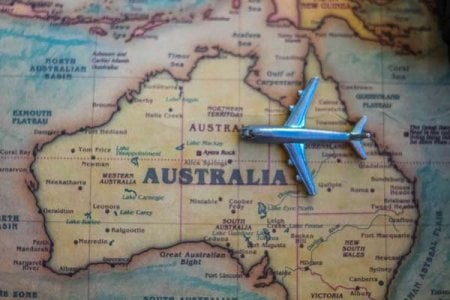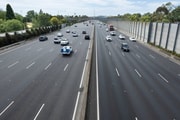Planning to leave Australia? Discover how the contentious 'travel tax' will hit your wallet!
- Replies 0
Australians are known for their love of travel, whether it's exploring the vast landscapes of their own backyard or jet-setting across the globe.
However, for those planning to depart from Australia, there's a new cost to consider that's stirring up quite the debate.
It's been dubbed the ‘travel tax’, and it's leaving some travellers and industry experts with furrowed brows.
The federal government has implemented a measure to strengthen biosecurity funding, which is essential for protecting our unique ecosystem and agricultural industries.
Following a change to the government’s fees and charges—as Agriculture Minister Murray Watt announced—an additional $47.1 million has been allocated to the biosecurity system to support this.
Starting from July 1, international travellers have been feeling the pinch with an increase of $10 to the passenger movement charge, bringing the total fee to $70 as outlined in the 2023 federal budget.

This uptick in cost is not just a random surcharge; it's earmarked to cover a portion of the expenses associated with managing biosecurity risks at our airports and cruise terminals.
But that's not all. Importer fees have also seen a rise after a 2023 review highlighted that the costs of delivering biosecurity and imported food regulatory activities had escalated.
These changes are deemed necessary to ensure the long-term funding of our biosecurity system.
Minister Watt emphasized the importance of a robust biosecurity system, stating, ‘A strong biosecurity system protects our $84 billion agriculture industry, national economy and our way of life.’
‘(As) risks continue to evolve, including in our region, a sustainably funded biosecurity system means we are better placed to meet the challenges of the future.’
While the Tourism and Transport Forum Australia acknowledged the need for enhanced biosecurity measures, its Chief Executive, Margy Osmond, expressed concerns.
‘This puts more pressure on the tourism industry by raising travel costs for both Australians and international visitors, which remain below pre-COVID levels,’ she pointed out.
‘We welcome part of this charge going towards protecting our biosecurity system, but the rest will go into consolidated revenue at a time when the sector is still facing significant challenges from rising living costs, skills shortages and a highly competitive global market.’
On the flip side, NSW Farmers has welcomed the charges. Biosecurity Committee Chair Ian McColl has even suggested further measures, such as a charge on import shipping containers, to ensure that those who create risks also share in the cost burden.
‘Continued biosecurity funding is essential—and on that, we can all agree—but a greater level of cost needs to be borne by the risk creators,’ he explained.
‘Farmers have been left to carry a significant burden of the cost associated with managing biosecurity outbreaks.’
‘Looking at all the options available and developing better biosecurity solutions is essential if governments want to protect our borders and keep our communities safe from these biosecurity risks,’ Mr McColl added.
As travel destinations worldwide grapple with new taxes aimed at tourists, the controversial travel tax recently implemented in Australia has sparked discussions globally.
Hawaii is currently considering a similar proposal, while Bali introduced its own tourist tax for 2024.
These developments underscore a growing trend among popular travel destinations to generate revenue from visitors, impacting both local economies and travellers alike.
 How do you feel about the increased passenger movement charge? Do you believe it's a fair price to pay for biosecurity, or should the government explore other avenues for funding? Share your opinions with us in the comments below.
How do you feel about the increased passenger movement charge? Do you believe it's a fair price to pay for biosecurity, or should the government explore other avenues for funding? Share your opinions with us in the comments below.
However, for those planning to depart from Australia, there's a new cost to consider that's stirring up quite the debate.
It's been dubbed the ‘travel tax’, and it's leaving some travellers and industry experts with furrowed brows.
The federal government has implemented a measure to strengthen biosecurity funding, which is essential for protecting our unique ecosystem and agricultural industries.
Following a change to the government’s fees and charges—as Agriculture Minister Murray Watt announced—an additional $47.1 million has been allocated to the biosecurity system to support this.
Starting from July 1, international travellers have been feeling the pinch with an increase of $10 to the passenger movement charge, bringing the total fee to $70 as outlined in the 2023 federal budget.

The Australian government raised the passenger movement charge by $10, making it $70, to support biosecurity measures. Credit: Shutterstock
This uptick in cost is not just a random surcharge; it's earmarked to cover a portion of the expenses associated with managing biosecurity risks at our airports and cruise terminals.
But that's not all. Importer fees have also seen a rise after a 2023 review highlighted that the costs of delivering biosecurity and imported food regulatory activities had escalated.
These changes are deemed necessary to ensure the long-term funding of our biosecurity system.
Minister Watt emphasized the importance of a robust biosecurity system, stating, ‘A strong biosecurity system protects our $84 billion agriculture industry, national economy and our way of life.’
‘(As) risks continue to evolve, including in our region, a sustainably funded biosecurity system means we are better placed to meet the challenges of the future.’
While the Tourism and Transport Forum Australia acknowledged the need for enhanced biosecurity measures, its Chief Executive, Margy Osmond, expressed concerns.
‘This puts more pressure on the tourism industry by raising travel costs for both Australians and international visitors, which remain below pre-COVID levels,’ she pointed out.
‘We welcome part of this charge going towards protecting our biosecurity system, but the rest will go into consolidated revenue at a time when the sector is still facing significant challenges from rising living costs, skills shortages and a highly competitive global market.’
On the flip side, NSW Farmers has welcomed the charges. Biosecurity Committee Chair Ian McColl has even suggested further measures, such as a charge on import shipping containers, to ensure that those who create risks also share in the cost burden.
‘Continued biosecurity funding is essential—and on that, we can all agree—but a greater level of cost needs to be borne by the risk creators,’ he explained.
‘Farmers have been left to carry a significant burden of the cost associated with managing biosecurity outbreaks.’
‘Looking at all the options available and developing better biosecurity solutions is essential if governments want to protect our borders and keep our communities safe from these biosecurity risks,’ Mr McColl added.
As travel destinations worldwide grapple with new taxes aimed at tourists, the controversial travel tax recently implemented in Australia has sparked discussions globally.
Hawaii is currently considering a similar proposal, while Bali introduced its own tourist tax for 2024.
These developments underscore a growing trend among popular travel destinations to generate revenue from visitors, impacting both local economies and travellers alike.
Key Takeaways
- The Australian government increased the passenger movement charge by $10, raising it to $70 to fund biosecurity measures.
- This increase was part of a larger strategy to enhance biosecurity funding, including a review of importer fees.
- The Tourism and Transport Forum Australia was concerned that the increased charge would add financial pressure on the tourism industry, which is still recovering from COVID-19 impacts.
- NSW Farmers supported the biosecurity funding, highlighting the need for risk creators to bear more cost and pointing out that farmers often shoulder significant costs from managing biosecurity outbreaks.








